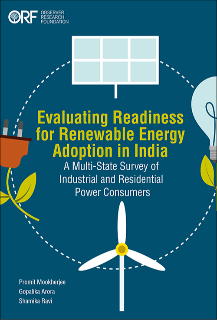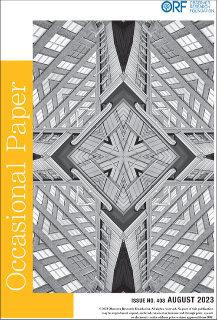The Observer Research Foundation organized a round table discussion on Climate Change on August 26, 2009 at its New Delhi campus. The theme speaker was Mr. Owen Jenkins, Counsellor for Climate Change and Energy, British High Commission and the DFID.

The Observer Research Foundation organized a round table discussion on Climate Change on August 26, 2009 at its New Delhi campus. The theme speaker was Mr. Owen Jenkins, Counsellor for Climate Change and Energy, British High Commission and the DFID. He spoke on the theme “Myths and Realities in Climate Change Negotiations”. Mr. Jenkins heads a cross Government unit which is responsible for handling all UK, India climate change and energy issues. Among the panel of discussants were Mr. Mukul Sanwal, Dr. Ramachandran – Member of the PM’s Council on Climate Change and Mr. M.K Venu – Editor (Opinion) with the Economic Times.
Positing the contours of the theme, Mr. Jenkins described myths as “a way of giving simplicity when the world is extremely complex and giving us clarity when the world is extremely obscure”. The construction of myths in the climate change debate is therefore inevitable because there are enormous complexities and obscurities and a huge amount that is unknown. Using the example of Al Gore’s film ‘An Inconvenient Truth’, he said that even though there were very useful simplifications, some of the difficult issues were left out.
Mr. Jenkins, who has been a member of the British diplomatic corps for 18 years, spoke of several myths in the climate change debate. One of the interesting but “very odd” myths in the developed world, he said, was the “idea that the world can return to a purer and simpler stage by removing the complexities of the industrial world”. He highlighted the need for unpacking this “apparent simplicity that is actually hiding some more useful complexity” in the negotiating forum.
Using the example of the positions on this issue within the developed world, he indicated that “there are huge differences in approaches and interests between Denmark or the UK and the US or Australia which are not sometimes unpacked by the developed world for the fear of appearing to be disunited or (for that matter even) by the developing world because sometimes the simplicity about that approach help both sides in their rhetoric if not reaching outcomes.” This is an important myth but unpacking these differences is delicate and controversial.
Mr. Jenkins discussed another set of myths on both sides. On the question of responsibility, he said that in the US there is a strong myth emerging that the real problem on the climate issue lies with the developing world. Thus a very interesting set of rhetoric is emerging from the US, when in reality it was the US which opted out of major climate commitments. The British diplomat also added that “the complexity of the developed world’s response to Kyoto is sometimes lost in a set of myth making that the developed world has failed to stand up to this.” He provided the reality by outlining the UK’s and the EU’s efforts to reach its overall target and that the UK is expecting to double its reduction targets against the 1990 baseline.
He also focused on two specific areas of negotiations, namely technology and finance. In the realm of finance, Mr. Jenkins highlighted that the UK position which underscores the importance of fund flows from the developed world to the developing world is clearly not representative of the entire grouping in which some believe the necessity of this financial support to be a myth. On the issue of technology transfer, there is a strong developed world myth that “this is all about the market”.
The end of Mr. Jenkins speech was followed by some eloquent and passionate responses and discussions. One of the lead participants in the discussion, Dr. Ramachandran listed realities that can no longer be brushed aside as myths. He highlighted the reality that the globe is warming and “unless we somehow constrain it, we are in for great trouble by the end of the century”. He reiterated a warning of the risk that the permafrost, which traps green house gases (GHG), might be under threat of melting and thus will only make the situation worse. He also spoke about carbon mitigation responsibility and emission reductions. Stressing the polluter pays principle, Dr. Ramachandran emphasized that “77% of the emissions in the atmosphere is due to the historical responsibility of the developed world and therefore they will have to take action first”. But, the debate has not extended into the historic responsibility that the developed countries have to take in terms of stocks of GHG before they address what the developing countries should be doing.
Further arguing with Jenkins claim that the UK and the EU are aiming to meet their emission reduction targets, he pointed out that “while the UK government has been talking of 80% cuts by 2050, at the same time there is apparent talk that 50% of these cuts will be met through offsets”. In effect, this means that the developing countries would have to take a larger burden than the developed countries, when it should be the other way round. Another myth that he highlighted was the ambiguity in the baseline, which was originally set at year 1990 by the United Nations Framework Convention on Climate Change (UNFCC) but is being altered with baselines such as 2000 or 2005 being mentioned.
Focusing primarily on Indian realities, another discussant Mr. MK Venu, Editor (Opinion) of Economic Times, spoke about India’s carbon footprint and the reality of the amount of electricity India consumes. He noted that the Prime Minister Manmohan Singh had mentioned at the G8 Summit last year that around 500 million people in India do not have access to electricity and another 300 million only receive it for about 12 hours a day. The fact is that a large number of people in India do not have any access to formal energy while a corresponding number of people in the EU and US together consume around 10,000 units of energy per capita.
The third discussant, Mr. Mukul Sanwal argued that climate change is largely perceived by the West through the imagery of “polar bears floating on ice floes” but the reality of the crisis is of adaptation to climate change, for example in Darfur which has witnessed brutal conflicts that many experts now concede are largerly contests over resources triggered by changing climate. This reality is never offered to the western audiences. Focusing on the conundrum of myths and realities, he highlighted the fact that the developed world has an unsustainable energy consumption pattern mainly attributed to transport and the use of household appliances but this is not stressed in the climate change debate. On the contrary, most of the debate is centered around the developing world who produce energy for its industries ad infrastructure growth. He thus questioned the responsibility of the West and interprets their claims for emission reductions as “no infrastructure for ”. Bringing up another myth, Mr. Sanwal added that there is a myth that “India and China are going to drown the world with their coal use”. But, he outlined that the reality is different. “Germany is setting up 14 lignite fired coal plants, which is the worst polluter”. He also revealed that IEA statistics show that coal use is in fact going to increase in the US. He summed up his argument by talking about adaptation in low carbon development – “ does not figure in that equation… what you (west) are really meaning is let us talk about mitigation, adaptation is your (south) problem”.
The two hour long discussion was chaired by Mr. Sunjoy Joshi, Distinguished Fellow ORF. Mr. Joshi eloquently summed up the entire discussion – “There is a kind of distrust that prevails between the developing and the developed world. How to get beyond this, how to actually unpack it, put it together, find a common solution, that is a challenge before all of us”.
The views expressed above belong to the author(s). ORF research and analyses now available on Telegram! Click here to access our curated content — blogs, longforms and interviews.




 PREV
PREV

